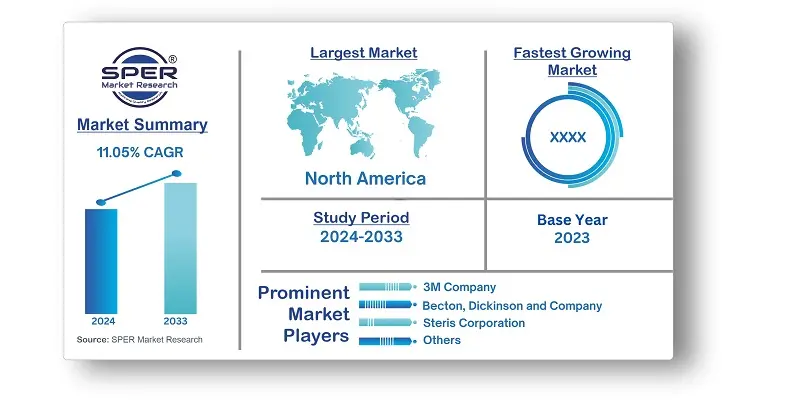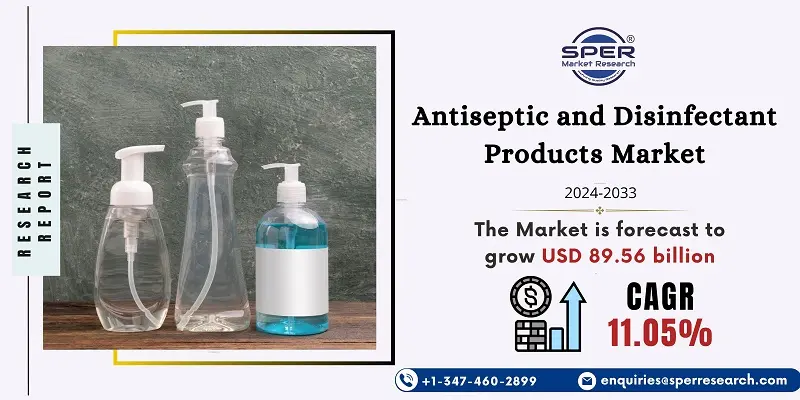
Antiseptic and Disinfectant Products Market Trends, Share, Size, Demand and Future Outlook
Antiseptic and Disinfectant Products Market Growth, Size, Trends Analysis- By Type, By End User, By Application- Regional Outlook, Competitive Strategies and Segment Forecast to 2033
| Published: Oct-2024 | Report ID: PHAR2413 | Pages: 1 - 228 | Formats*: |
| Category : Pharmaceutical | |||
- June 2021; Metrex Research, LLC unveiled CaviWipe 2.0, a new line of surface disinfection wipes. These multifunctional disinfection wipes provide protection against 42 other viral strains in addition to SARS-CoV-2.
- February 2021; Proctor & Gamble unveiled a brand-new antibacterial household sanitizer called Microban 24. Microban 24 comes in three different forms: a multipurpose cleaner, a bathroom cleanser, and a sanitizing spray.


| Report Metric | Details |
| Market size available for years | 2020-2033 |
| Base year considered | 2023 |
| Forecast period | 2024-2033 |
| Segments covered | By Type, By End User, By Application. |
| Regions covered | North America, Asia-Pacific, Latin America, Middle East & Africa, and Europe. |
| Companies Covered | 3M Company, Cantel Medical Corporation, Becton, Dickinson and Company, Procter and Gamble, SC Johnson Professional, Steris Corporation, The Clorox Company, Reckitt Benckiser Group plc, Steris PLC. |
- Construction Companies and Contractors
- Architects and Designers
- Real Estate Developers
- Wood Product Manufacturers
- Government Bodies and Regulatory Agencies
- Investors and Venture Capitalists
- Distributors and Suppliers
| By Type: | |
| By End User: | |
| By Application: |
- Global Antiseptic and Disinfectant Products Market Size (FY’2024-FY’2033)
- Overview of Global Antiseptic and Disinfectant Products Market
- Segmentation of Global Antiseptic and Disinfectant Products Market By Type (Quaternary Ammonium Compounds, Chlorine Compounds, Alcohols, and aldehyde Products, Enzymes, and Others)
- Segmentation of Global Antiseptic and Disinfectant Products Market By End User (Hospitals and Clinics, Homecare, and Other End Users)
- Segmentation of Global Antiseptic and Disinfectant Products Market By Application (Enzymatic Cleaners, Medical Device Disinfectants, Surface Disinfectants, and Other Applications)
- Statistical Snap of Global Antiseptic and Disinfectant Products Market
- Expansion Analysis of Global Antiseptic and Disinfectant Products Market
- Problems and Obstacles in Global Antiseptic and Disinfectant Products Market
- Competitive Landscape in the Global Antiseptic and Disinfectant Products Market
- Impact of COVID-19 and Demonetization on Global Antiseptic and Disinfectant Products Market
- Details on Current Investment in Global Antiseptic and Disinfectant Products Market
- Competitive Analysis of Global Antiseptic and Disinfectant Products Market
- Prominent Players in the Global Antiseptic and Disinfectant Products Market
- SWOT Analysis of Global Antiseptic and Disinfectant Products Market
- Global Antiseptic and Disinfectant Products Market Future Outlook and Projections (FY’2024-FY’2033)
- Recommendations from Analyst
1.1. Scope of the report1.2. Market segment analysis
2.1. Research data source
2.1.1. Secondary Data2.1.2. Primary Data2.1.3. SPERs internal database2.1.4. Premium insight from KOLs
2.2. Market size estimation
2.2.1. Top-down and Bottom-up approach
2.3. Data triangulation
4.1. Driver, Restraint, Opportunity and Challenges analysis
4.1.1. Drivers4.1.2. Restraints4.1.3. Opportunities4.1.4. Challenges
4.2. COVID-19 Impacts of the Global Antiseptic and Disinfectant Products Market
5.1. SWOT Analysis
5.1.1. Strengths5.1.2. Weaknesses5.1.3. Opportunities5.1.4. Threats
5.2. PESTEL Analysis
5.2.1. Political Landscape5.2.2. Economic Landscape5.2.3. Social Landscape5.2.4. Technological Landscape5.2.5. Environmental Landscape5.2.6. Legal Landscape
5.3. PORTERs Five Forces
5.3.1. Bargaining power of suppliers5.3.2. Bargaining power of buyers5.3.3. Threat of Substitute5.3.4. Threat of new entrant5.3.5. Competitive rivalry
5.4. Heat Map Analysis
6.1. Global Antiseptic and Disinfectant Products Market Manufacturing Base Distribution, Sales Area, Product Type6.2. Mergers & Acquisitions, Partnerships, Product Launch, and Collaboration in Global Antiseptic and Disinfectant Products Market
7.1. Global Antiseptic and Disinfectant Products Market Size, Share and Forecast, By Type, 2020-20267.2. Global Antiseptic and Disinfectant Products Market Size, Share and Forecast, By Type, 2027-20337.3. Quaternary Ammonium Compounds7.4. Chlorine Compounds7.5. Alcohols7.6. Aldehyde Products7.7. Enzymes7.8. Others7.9. Curved Beams
8.1. Global Antiseptic and Disinfectant Products Market Size, Share and Forecast, By End User, 2020-20268.2. Global Antiseptic and Disinfectant Products Market Size, Share and Forecast, By End User, 2027-20338.3. Hospitals and Clinics8.4. Homecare8.5. Other End Users
9.1. Global Antiseptic and Disinfectant Products Market Size, Share and Forecast, By Application, 2020-20269.2. Global Antiseptic and Disinfectant Products Market Size, Share and Forecast, By Application, 2027-20339.3. Enzymatic Cleaners9.4. Medical Device Disinfectants9.5. Surface Disinfectants9.6. Other Applications
10.1. Global Antiseptic and Disinfectant Products Market Size and Market Share
11.1. Global Antiseptic and Disinfectant Products Market Size and Market Share By Region (2020-2026)11.2. Global Antiseptic and Disinfectant Products Market Size and Market Share By Region (2027-2033)11.3. Asia-Pacific
11.3.1. Australia11.3.2. China11.3.3. India11.3.4. Japan11.3.5. South Korea11.3.6. Rest of Asia-Pacific
11.4. Europe
11.4.1. France11.4.2. Germany11.4.3. Italy11.4.4. Spain11.4.5. United Kingdom11.4.6. Rest of Europe
11.5. Middle East and Africa
11.5.1. Kingdom of Saudi Arabia11.5.2. United Arab Emirates11.5.3. Qatar11.5.4. South Africa11.5.5. Egypt11.5.6. Morocco11.5.7. Nigeria11.5.8. Rest of Middle-East and Africa
11.6. North America
11.6.1. Canada11.6.2. Mexico11.6.3. United States
11.7. Latin America
11.7.1. Argentina11.7.2. Brazil11.7.3. Rest of Latin America
12.1. 3M Company
12.1.1. Company details12.1.2. Financial outlook12.1.3. Product summary12.1.4. Recent developments
12.2. Cantel Medical Corporation
12.2.1. Company details12.2.2. Financial outlook12.2.3. Product summary12.2.4. Recent developments
12.3. Becton
12.3.1. Company details12.3.2. Financial outlook12.3.3. Product summary12.3.4. Recent developments
12.4. Dickinson and Company
12.4.1. Company details12.4.2. Financial outlook12.4.3. Product summary12.4.4. Recent developments
12.5. Procter and Gamble
12.5.1. Company details12.5.2. Financial outlook12.5.3. Product summary12.5.4. Recent developments
12.6. Steris Corporation
12.6.1. Company details12.6.2. Financial outlook12.6.3. Product summary12.6.4. Recent developments
12.7. The Clorox Company
12.7.1. Company details12.7.2. Financial outlook12.7.3. Product summary12.7.4. Recent developments
12.8. Reckitt Benckiser Group plc
12.8.1. Company details12.8.2. Financial outlook12.8.3. Product summary12.8.4. Recent developments
12.9. Steris PLC
12.9.1. Company details12.9.2. Financial outlook12.9.3. Product summary12.9.4. Recent developments
12.10. Ecolab Inc.
12.10.1. Company details12.10.2. Financial outlook12.10.3. Product summary12.10.4. Recent developments
12.11. Others
SPER Market Research’s methodology uses great emphasis on primary research to ensure that the market intelligence insights are up to date, reliable and accurate. Primary interviews are done with players involved in each phase of a supply chain to analyze the market forecasting. The secondary research method is used to help you fully understand how the future markets and the spending patterns look likes.
The report is based on in-depth qualitative and quantitative analysis of the Product Market. The quantitative analysis involves the application of various projection and sampling techniques. The qualitative analysis involves primary interviews, surveys, and vendor briefings. The data gathered as a result of these processes are validated through experts opinion. Our research methodology entails an ideal mixture of primary and secondary initiatives.



Frequently Asked Questions About This Report
PLACE AN ORDER
Year End Discount
Sample Report
Pre-Purchase Inquiry
NEED CUSTOMIZATION?
Request CustomizationCALL OR EMAIL US
100% Secure Payment






Related Reports
Our Global Clients
Our data-driven insights have influenced the strategy of 200+ reputed companies across the globe.






















